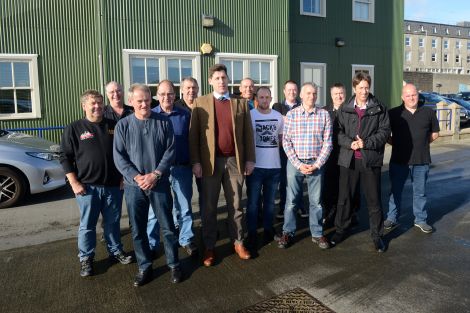News / Fishermen press Scotland Office minister on Brexit plans
SHETLAND fishermen have reiterated their desire to see the UK take control of its waters post-Brexit after meeting with Scotland Office minister Lord Duncan on Friday.
Shetland Fishermen’s Association chairman Leslie Tait said he believes the Conservative politician “absolutely understands what a great opportunity Brexit presents for significant growth in Shetland’s single most important industry.”
Lord Duncan, meanwhile, dismissed claims from the SNP that the UK government is attempting a “power grab” on laws post-Brexit and voiced his support for quota levels to be increased in the years ahead.
His visit to Shetland this week has taken in a wide range of industries – from farming and fishing to oil and gas – as he gathered views on the UK’s impending exit from the European Union to feed back to the government.
The seafood industry is thought to be worth around £300 million to Shetland and there have been concerns that fishing may be used is a bargaining chip in Brexit negotiations as the UK looks ahead to leaving the EU’s much-maligned Common Fisheries Policy.
But speaking about fishing representatives’ meeting with Lord Duncan, Tait said he is confident that the industry’s interests will be fought for by the UK government.
“Right back to the days when I was regularly at sea, fishermen have felt left behind by a system that allowed overseas boats to fish often very close to our shores at times when we were unable to,” he said.
“That can now be rectified, and we hope and expect ministers in the Brexit negotiations to stand up for our industry, restore control and let us negotiate any access as a fishing nation in the annual coastal states talks like Norway does.”
Speaking to reporters on Thursday, Lord Duncan said it would be a “disgrace” to see fisheries access traded away in EU negotiations.
Become a member of Shetland News
He added that the UK government is happy to liaise with the Scottish Government on the allocation of fishing quotas, despite the SNP claiming that fisheries is one of 111 policy areas in which Westminster is looking to bypass MSPs.
“Fishermen up and down the land are hopeful that there will be more quota,” Lord Duncan said.
“That makes perfect sense – the bulk of the fish is caught in our waters. The question then comes – how shall that quota be allocated?
“If you were to allocate it, as the previous quota was allocated, based on a track record which had been historically determined, then a large amount of that would go to England, if you devolved it right down to that level.
“At the moment, they probably couldn’t catch it, and don’t have the vessels to catch it. So if you devolve the quota right down to that level you’re going to create a problem potentially for a quota that remains uncaught, and for Scottish vessels not getting as they would argue entitlement to which they legitimately expect.
“So should there be a common British quota approach, or not? We’ve suggested to the Scottish Government to talk about that, and they’re suggesting that’s a power grab.”
Agriculture subsidises were also discussed during Lord Duncan’s visit to the isles and he said he recognised the special circumstances rural isles famers and crofters work in, suggesting that payment plans could be modified post-Brexit to recognise this.
The UK government has committed to maintaining subsidises currently paid by the EU until 2022, but it is unclear how the future will pan out.
“The question thereafter is what level should farm subsidies represent,” Duncan said.
“At the moment, we have a formula in place which in effect allows European money to be plugged into the formula, and it determines who gets what amount.
“So we need to make sure there is a formula in place at a UK level to determine the actual amount, clearly defined and right at the beginning so there is no dubiety about who gets what part. And thereafter, that money has to be administered by the devolved administrations to deliver it against the criteria they’ve set for its payment.
“The question I suppose that the farmers today were asking, they were saying they need to make sure there is a very clear ring fencing of farm payments for upland farmers, for hill sheep farmers, which I absolutely understand, and to a large degree that will be determined by the Scottish Government’s determination of the delivery mechanisms for their payments.
“We need to decide whether that’s the best way of determining how the payments move – it need not be a common structure anymore. We could look at that being done differently, but we need to talk with Scottish Government, the Welsh Government and Northern Irish to work out what’s best.”
Become a member of Shetland News
Shetland News is asking its many readers to consider paying for membership to get additional features and services: -
- Remove non-local ads;
- Bookmark posts to read later;
- Exclusive curated weekly newsletter;
- Hide membership messages;
- Comments open for discussion.
If you appreciate what we do and feel strongly about impartial local journalism, then please become a member of Shetland News by either making a single payment, or setting up a monthly, quarterly or yearly subscription.





























































